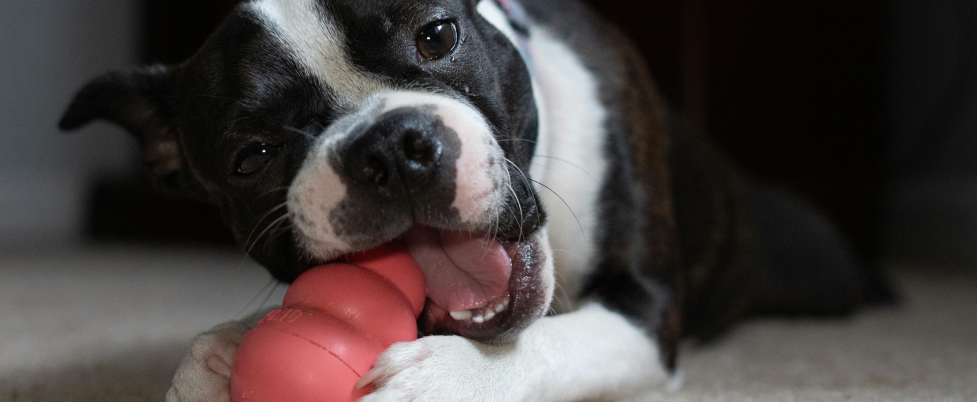THE CARE CORNER / DENTAL CARE

Disclaimer: I am not a vet. This article is for informational purposes only. Please consult a veterinarian for professional advice regarding your Boston Terrier’s dental health.
Introduction: Why Dental Care Matters for Your Boston Terrier
Just like humans, dogs need proper dental care to maintain overall health. Poor dental hygiene in Boston Terriers can lead to gum disease, tooth loss, and other serious health issues, such as heart disease or kidney problems. Regular dental care helps keep their smiles sparkling and their bodies healthy.
1. Understanding Common Dental Issues in Boston Terriers
Tartar Buildup and Plaque
- The most common dental problem in Boston Terriers is the accumulation of tartar and plaque, which can lead to gum disease.
- If left untreated, tartar can cause inflammation and infection in the gums.
Periodontal Disease
- Affects the gums and bone structure around the teeth.
- It is caused by untreated plaque buildup and can result in painful abscesses or tooth loss.
Tooth Decay and Gum Infections
- Boston Terriers are prone to tooth decay due to their small mouths and crowded teeth.
- Gum infections can lead to more severe health problems if not addressed.
2. How to Keep Your Boston’s Teeth Healthy
Brushing Your Boston’s Teeth
- Brush 2-3 times a week with dog-specific toothpaste to prevent plaque buildup.
- Never use human toothpaste, as it can be harmful to dogs.
- Start brushing early to help your dog get used to it and make it a positive experience.
Dental Chews and Toys
- Provide dental chews to help reduce plaque and tartar buildup.
- Use rubber chew toys or textured nylon bones that promote healthy teeth.
- Be cautious of chew toys that are too hard, like bones or antlers, which could fracture teeth.
Dental Treats
- Give dental treats that are designed to clean teeth and freshen breath.
- Ensure they are sized correctly to avoid choking hazards.
3. Signs Your Boston May Have Dental Problems
Bad Breath (Halitosis)
- A common sign of dental issues is foul-smelling breath, which can indicate plaque buildup or gum disease.
Red or Bleeding Gums
- If your Boston’s gums appear inflamed, red, or bleed when you brush their teeth, this could be a sign of gingivitis or other gum problems.
Excessive Drooling or Trouble Eating
- Drooling, pawing at the mouth, or difficulty eating may signal oral pain or tooth issues.
Loose or Missing Teeth
- If your Boston’s teeth are loose, cracked, or missing, immediate attention from a vet is necessary.
4. Professional Dental Care for Your Boston
Annual Vet Checkups
- Schedule regular veterinary checkups to catch any dental issues early.
- Your vet will check for gum disease, tooth decay, and other oral health problems.
Professional Cleanings
- Have your Boston’s teeth professionally cleaned at least once a year to remove tartar buildup that cannot be cleaned at home.
- Professional cleanings may involve sedation, so it’s important to consult with your vet about the best care plan for your dog.
5. Natural Remedies and Home Care
Water Additives for Dental Health
- Use water additives to help reduce plaque buildup and freshen your dog’s breath.
- Always consult your vet before using these products to ensure they are safe for your Boston.
Healthy Diet and Hydration
- A balanced diet, rich in high-quality proteins, can contribute to your dog’s overall dental health.
- Fresh water is essential for keeping the mouth clean and preventing bad breath.
6. When to See a Vet for Your Boston’s Teeth
Pain or Discomfort
- If your Boston is showing signs of pain (e.g., chewing on one side, sensitivity to touch around the mouth), it’s time for a vet visit.
Severe Bad Breath
- If the bad breath persists despite good oral care, it could be a sign of a deeper issue, such as an infection or disease.
Gum Infections or Abscesses
- If you notice swelling or pus around the gums, your Boston may have an infection that requires veterinary treatment.
Conclusion: Consistent Care for Long-Term Health
Maintaining your Boston’s dental health doesn’t have to be complicated. With regular brushing, dental chews, and annual vet visits, you can help prevent dental problems and keep your dog’s smile healthy and sparkling for years to come. Always consult with your vet for the best practices and products to ensure your Boston’s teeth stay in top condition.

For more information on dog dental care, check out trusted sources like the American Kennel Club (AKC) or American Veterinary Medical Association (AVMA) for professional advice and tips on keeping your dog’s teeth healthy.
Looking for ideas of what your Boston can chew on, check out our article The Best Dental Treats for Boston Terriers
Other articles by this author

“Hi! I’m Weezie, a spirited Boston Terrier / French Bulldog mix and self-proclaimed expert on everything Boston.
Boston Terriers are prone to a few common health challenges, but with the right care, you can help them stay happy and comfortable. Start with our general grooming guide to cover basics. For skin health, keeping their coat smooth covers how to prevent dryness and irritation. Since eye problems are common in the breed, make sure to check out our eye health guide to learn about symptoms and care tips. And if allergies are affecting your Boston, our article on what to know about Boston Terrier allergies will help you identify triggers and find relief for your pup.
- The Care Corner
- Boston Terrier Grooming Tips: Keep Your Boston Looking Sharp
- Boston Terrier Coat Care: Keep Their Fur Beautiful
- Boston Terrier Ear and Nail Care: No Fuss, No Mess
- Bathing Your Boston: Frequency & Fun Tips
- Allergies & Your Boston: What to Know
- Boston Terrier Skin TLC: How to Keep Them Smooth
- Is Your Boston’s Eye Health on Point?
- How to Help Your Boston Terrier Breathing
- The Best Dental Treats for Boston Terriers